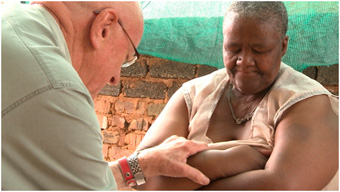Robi Damelin lost her younger son David to a Palestinian sniper's bullet while he was manning a military checkpoint in the West Bank. At first Robi tried to contact her son's killer, who is now serving time in an Israeli prison. She wanted to launch a dialogue with him and his parents, but the Palestinian refused. After all, he explained, her son was part of the forces of Occupation army that was denying his people their sovereignty. Undeterred, Robi decided to return to South-Africa to see how the country where she was born had embarked on a quest to achieve forgiveness and reconciliation after decades of apartheid.
The Truth and Reconciliation Committee (TRC) began operating soon after South Africa finally abandoned apartheid. Fifteen years later, Robi meets with perpetrators from both sides of the conflict, and tries to understand the motivations that brought them to confront their victims and publicly declare their crimes. Was the expected pardon (given by the TRC to everyone who told the truth) their only incentive? Was it the ultimate realization that acknowledging the pain they caused, combined with sincere remorse, could really achieve reconciliation and ensure a better future for everyone?
We follow Adriaan Vlok, a former Minister of Law and Order in the apartheid government, as he embarks on his monthly routine of bringing food to the victims' families. As we witness these painful and agitating encounters with mothers who lost their sons to the regime of which he was a part, we discover the many ways that these women deal with Vlok's remorse and acceptance of responsibility.
One of the mothers that Robi meets lost her daughter Lyndi, twenty years ago. Rather than bearing her loss like a festering sore, she has chosen to cooperate with the very person who was responsible for her daughter's death in a series of activities to benefit former freedom fighters. Robi wonders if this can lead to real forgiveness. Can cooperation and dialogue between victims and perpetrators change both sides' approach to the past and encourage new ways of dealing with an open wound? Does it really make a difference, twenty years later?
Robi ponders the possibility of meeting David's killer and can't help wonder how honest she has been with herself in her quest for reconciliation. The release of Gilad Shalit in exchange for prisoners "with blood on their hands" poses a new challenge for her and her older son.
This film is a poignant moving journey through South Africa, Israel and Palestine, three lands that have been scorched and burned for generations. Yet only South Africa is now tending to its embers; Israel and Palestine are still ablaze. As we follow Robi on her journey, we can't help but wonder whether reconciliation will ever really be achieved? Can a person who stole the life of a woman's child ever truly be forgiven? Is the acceptance of responsibility the path to sincere remorse? Is the dialogue between perpetrators and victims the key to ending this bloody conflict?
This thought-provoking journey, through South Africa past and present and through the cooperation of bereaved Israeli and Palestinian parents shows Robi and the viewers that even from a place of pain one can see a glimmer of hope.

Adriaan Vlok, South Africa's former Minister of Law and Order from the Apartheid Era and a bereaved mother in the Mamelodi Township.